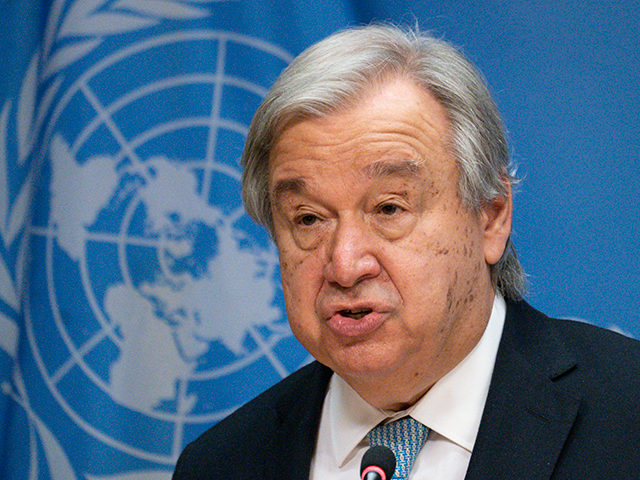United Nations Secretary-General Antonio Guterres on Monday demanded the formation of an international peacekeeping force to combat gang violence and restore stable government in Haiti.
He also asked other governments to stop deporting Haitians back to their impoverished, sick, and violent island.
“The people of Haiti are suffering the worst human rights and humanitarian emergency in decades,” Guterres said, citing gang violence as the leading cause.
Guterres said Haitian police were losing the war against gangs because they are outnumbered, underfunded, and corrupt. He noted “allegations that a significant number of national police” are affiliated with the gangs they are supposed to be fighting.
The U.N. on Monday issued a dire report on Haiti that found killings surged by 35 percent in 2022, kidnappings exploded by over 100 percent, and gangs now control much of the territory outside the capital of Port-au-Prince – and they control over half of Port-au-Prince to boot.
Gang violence has thwarted both local and international efforts to control a deadly cholera outbreak. It has also crippled the already weak Haitian economy, which is currently experiencing 47 percent inflation, leaving 58 percent of the population beneath the poverty line.
“Gangs have increasingly resorted to the deliberate killing of men, women and children with snipers positioned on rooftops. Dozens of women and children as young as 10 years old have been brutally raped, as a tactic to spread fear and destroy the social fabric of communities under the control of rival gangs,” the top U.N. official in Haiti, Helen La Lime, told the U.N. Security Council at a meeting on Tuesday.
“Close to 5 million people are facing conditions of acute hunger across the country, and while 90% of schools are now operating, thousands of children, especially those living in gang-affected areas, are yet to start the school year. And there are increasing reports of minors being recruited to serve in gangs,” La Lime said.
The problem is that no one wants to participate in such an international force, much less lead it. The remnants of the Haitian government cannot offer much support for the effort, and the Haitian people would likely turn against peacekeepers as invaders or accuse them of propping up a local government they despise. Vicious street battles against savage gangsters, with the high probability of civilian casualties, await foreign troops.
“Hopes that the United States or Canada might lead the force have not materialized, although both countries have sent equipment to assist the Haitian National Police. There has been little interest in contributing forces among the wider international community,” Voice of America News (VOA) observed on Tuesday.
The Washington Post in December noted that even the most dedicated humanitarian agencies are pulling out of Haiti because little can be done to address sickness or starvation while criminals are running wild:
The quiet departure of nongovernmental aid organizations, including ones based in the United States, has compounded the country’s humanitarian emergency, leaving the poorest and sickest segments of the population without help. The results are mounting chaos and deteriorating public health in a country where nearly 90 percent of the 11.5 million people live on less than $7 a day, and 30 percent struggle on a daily income of barely more than $2. Nearly half of the population lives with what the United Nations regards as acute food insecurity, and some 20,000 more face famine. The gangs have shut down swaths of territory and facilities, including many of the nation’s schools, and played havoc with the transportation of basic goods.
The Washington Post chastised the Biden administration for its inadequate response to the Haitian crisis, noting that the administration has only “seven people on the ground in Haiti” and none of them is a senior diplomat, much less a fully-credentialed ambassador.
On the other hand, Haiti does not actually have a government that anyone could be an ambassador to. The last of its elected officials retired from their posts two weeks ago, leaving only the unelected and supposedly temporary Prime Minister Ariel Henry, who is regarded by a fair number of Haitians as an illegitimate dictator.
The Biden administration dispatched USAID Deputy Administrator Isobel Coleman to Haiti on Tuesday for a two-day visit. Soon after her arrival, the administration announced $56.5 million in additional humanitarian aid, including resources to combat the cholera epidemic. USAID stated the money would be distributed directly to humanitarian organizations, not the Haitian government.
“The new assistance will also provide urgent food assistance, as 4.7 million people face a severe food crisis, and will support gender-based violence prevention and response services for the most vulnerable,” USAID added.
American Airlines also announced on Tuesday that it will airlift medical supplies from Europe to Haiti via Miami.

COMMENTS
Please let us know if you're having issues with commenting.